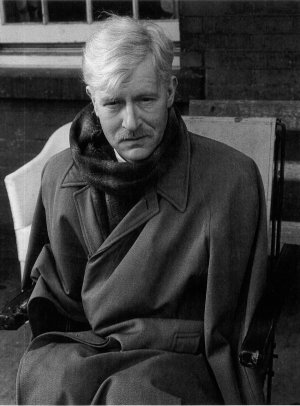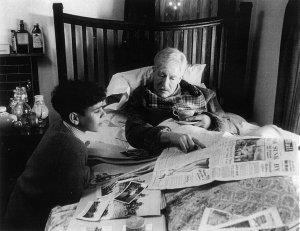A Better Class of Person
|
A Better Class of
Person
With Alan Howard and Eileen
Atkins
Thames Television
Executive Producer: Lloyd
Shirley
Producer-Director: Frank Cvitanovich
Writer: John Osborne
120
minutes.
This two-hour biofilm based on the boyhood of
actor-playwright John Osborne, with wraparound commentary by the author, makes
absorbing tv which owes much to Frank Cvitanovich's sensitive
direction.
It is an entertaining evocation of drab,
wartime Britain, exploiting period songs and radio shows to suggest some of the
influences which made Osborne an angry young man of the 1950s.
Osborne's aim is to emphasize and explain a
much-vaunted hatred for his mother Nellie. Eileen Atkins' sympathetic
portrayal, however, is that of a hardworking woman, unable to communicate with
her dying intellectual husband, Tom (Alan Howard) or her difficult, bookish
son. |

|
Osborne, the romantic schoolboy, reserves his filial
affection for his terminally tubercular father, but the adolescent also
impresses as an unpleasant, lonely rebel.
The storyline follows the Osborne family from London
to the small offshore Isle of Wight and back to suburban Surrey, and covers the
author's pubescent affair with the boarding school principal's niece which
resulted in his expulsion.
Blake.
Variety, Wednesday July 31st,
1985.
A Better Class of Person
Some thirty years ago, the British theater was rocked
out of its drawing-room complacency by Look Back in Anger. The play was
written by John Osborne, the most prominent of a group dubbed "the angry young
men." Not too many commentators at the time considered that Mr Osborne might be
less interested in demolishing the aristocracy than in getting a firm foothold
for himself on the social ladder. Behind much of the anger, it seemed, was
simple resentment and envy.
More recently, Mr Osborne ha been focusing on his own
early years, in a published autobiography and in a script for a subsequent
film. Both are called A Better Class of Person. The film was produced
and directed for Thames Television by Frank Cvitanovich, and it can be seen on
Channel 13 at 10 tonight as part of a weeklong Thames on 13 salute to
the British company.
The story begins in London in the late 1930s as war
with Germany is breaking out. John is a schoolboy living in very modest
circumstances with his pinched, rather disapproving mother and his invalid
father, a quiet man spending nearly all of his time in bed reading. Life for
the boy is mean and dreary, as dispiriting as the weather that remains dismal
even at the family's favorite sea resort. Somewhat disconcertingly, John
Osborne himself pops up at that resort, recalling: "A few summers ago I brought
my daughter here. A few concessions to fashiion and dress, it could've been
1938." Back on the story of his early years, he says, "A time comes and the
slime can be safely scraped away.
|
In fact the scraping is minimal, and that is
why this film version of A Better Class of Person is so generally
disappointing, despite innumerable moments of insight and a beautiful evocation
of the period. Mr Osborne's script is clearly too taken with himself, while it
is the father, played by Alan Howard, and especially the mother, indelibly
etched by Eileen Atkins, who truly pique our interest. Portrayed at different
stages by Gary Capelin and Neil McPherson, the boy, a victim of rheumatic
fever, is a quiet, withdrawn lad, whose sensitivity can border on arrogance.
Mom is not far off the mark when she says, "Sometimes I think you can't have
any feelings at all - like a bloody German, you are."
|

|
With the start of the war, the Osbornes, with their
incapacitated head of family, are sent to the Isle of Wight, courtesy of a
local society whose aristocratic chairwoman reminds them of how lucky they are.
Mom fawningly agrees that everyone's been ever so kind. But the new home turns
out to be a lonely spot that leaves Mom longing for the bombs of London. When
Dad dies in 1940, apparently much to his relief, mother and son head back to
the mainland where the charitable society will arrange to get him a schooling
that will fit in with her social ambitions.
Growing up during the war years is captured
effectively, from air-raid drills in school to the reports of former students
being reported killed in the war. There is also the powerful presence of
American pop culture, in songs and in such movies as Yankee Doodle Dandy
and Double Indemnity. But we do keep wishing to see more of Miss Atkin's
Mom, who is not impressed with young John's standoffishness. "Not like me," she
says. "I like company and a bit of a joke." But Mr Osborne can hardly take his
eyes off his younger self, and, just in case we didn't know or perhaps forgot,
he returns when the story reaches 1945 to inform us that, in just 11 years,
Look Back in Anger would reach the stage. A touch more humility would
have helped enormously.
John J. O'Connor
New York Times, Wednesday March 25th
1987.

